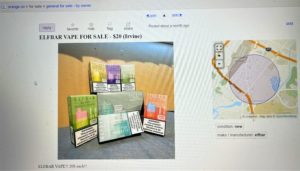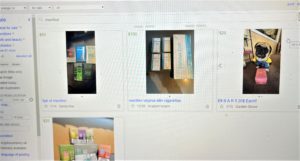Research: Vaping Flavor Bans Boost Black Markets
- Flavors News This Week
- February 22, 2023
- 6 minutes read

Credit: Luxor Photo

Flavor bans are creating black markets that cost U.S. states a massive amount of money in lost taxes, according to the latest research.
Just go to any online consumer-to-consumer website and flavored vaping and other tobacco products are for sale in states with flavored tobacco bans. A quick search for menthol on sites such as Craigslist and OfferUp in California or Massachusetts, where flavored products are banned, will yield results for every flavor of vaping product from apple to vanilla for sale. You can also find nearly every brand of menthol cigarettes for purchase on the online black market.
New York, New Jersey and Rhode Island also have barred the sale of flavored vaping products. Massachusetts and California banned all flavored tobacco items, including flavored cigars, cigarettes and vaping goods. Since California’s flavored tobacco ban went into effect on Dec. 21, one week after the U.S. Supreme Court blocked R.J. Reynolds Tobacco Co.’s contention that the new state law conflicted with federal law, the state’s black market for flavored tobacco products has grown exponentially.
 Stat News reported that in January it visited 24 California vape shops throughout Oxnard, Ventura, Pasadena, El Monte, Carson and West Hollywood—all of which have had bans on flavored vapes on the books for at least a year and most for two or more years. Seventeen of the shops, or 70 percent, were selling the products anyway. In Oxnard, where the news group visited five shops, none of the stores sold flavored vapes.
Stat News reported that in January it visited 24 California vape shops throughout Oxnard, Ventura, Pasadena, El Monte, Carson and West Hollywood—all of which have had bans on flavored vapes on the books for at least a year and most for two or more years. Seventeen of the shops, or 70 percent, were selling the products anyway. In Oxnard, where the news group visited five shops, none of the stores sold flavored vapes.
States in the proximity of states that have enacted flavor bans have some of the highest tobacco smuggling rates in the country. A report by the nonpartisan Tax Foundation found that New York has the highest inbound smuggling activity, with an estimated 53.5 percent of cigarettes consumed in the state deriving from smuggled sources in 2020. New York is followed by California (44.8 percent).
New Hampshire has the highest level of net outbound smuggling at 52.4 percent of consumption. This is likely due to the state’s relatively low tax rates and proximity to states with strict tobacco regulations and high taxes. The report said the move by other Northeast states to raise cigarette taxes and ban certain tobacco products have made cigarette smuggling a lucrative criminal initiative.
“People respond to incentives,” said Adam Hoffer, the Tax Foundation’s director of excise tax policy. “As tax rates increase or products are banned from sale, consumers and producers search for ways around these penalties and restrictions.”

Last year, JAMA Internal Medicine published a study about the impact of banning flavored tobacco products in Massachusetts. The study found that the sale of flavored tobacco decreased following the ban. However, when comparing sales in Massachusetts with sales across 27 other states, the authors found that sales had decreased more in Massachusetts than in the control states.
“Such a result would indicate that the flavor ban has been a success. Unfortunately, the study left out a very important piece of information: cross-border trade,” Ulrik Boesen, also with the Tax Foundation, stated at the time. “The end result of the ban, in fact, is that Massachusetts is stuck with the societal costs associated with consumption while the revenue from taxing flavored tobacco products is being raised in neighboring states.”
A 2022 report from the Massachusetts Multi-Agency Illegal Tobacco Taskforce found that in 2021, state police and the Department of Revenue seized more than 5,000 packs of cigarettes and more than 100,000 vapor products. It also details multiple investigations and prosecutions, including ones leading to sentences of six months to a year. Some of these were for smuggling that predate the flavor ban, but others clearly involve it.
For example, the report notes an ongoing investigation into a February 2022 seizure of more than 5,000 flavored e-cigarettes as well as a motor vehicle stop that netted “a large quantity of untaxed flavored ENDS [electronic nicotine-delivery system] products, cigars, smokeless tobacco and cigarettes” representing $21,000 in unpaid taxes. “As it happens, looking at the New England region as a whole confirms that the flavor ban did not work as intended. Sales moved around rather than disappeared, and the ban evidently did not impact consumption,” stated Boesen. “Total sales for the region decreased by slightly more than 1 percent comparing the 12 months preceding the ban to the 12 months following the ban—largely comparable to the national sales trends.”